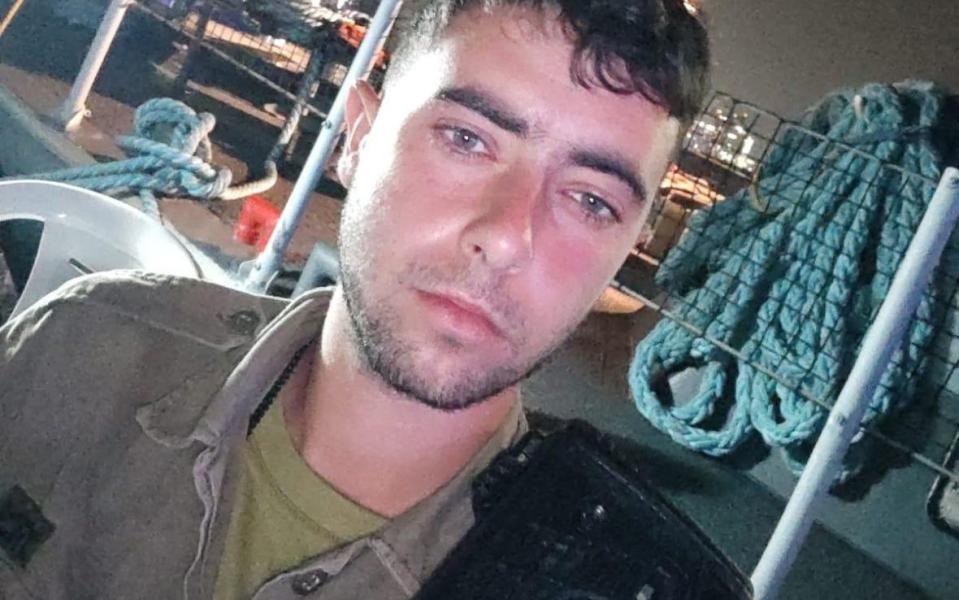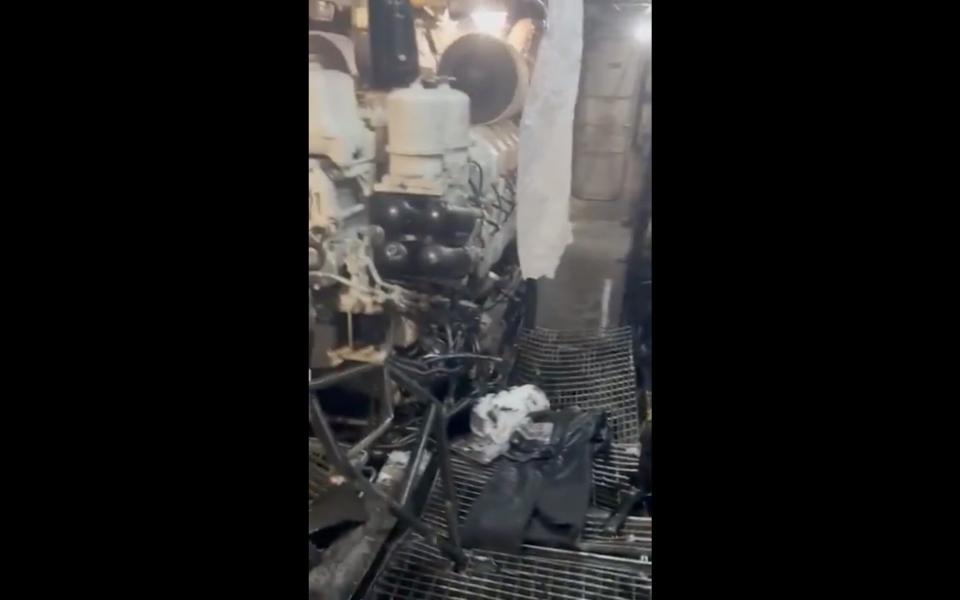[ad_1]
Since the Israeli assassination of a senior Hezbollah commander in Beirut in July, the world has braced for a retaliation that could open up a new axis of war in the Middle East.
However, some of the worst scenes of destruction from the barrage of 300 drones and rockets fired from Lebanon on Sunday were at a humble chicken coop in northern Israel.
The chicken farm in northern Israel was hit by a rocket, causing damage to the exterior structure.
Firefighters were seen putting out small flames left by the rocket.
A farmer picked debris out of the coup on Sunday afternoon, wading through a pen packed with his flock.
Click here to view this content.
Hezbollah chief Hassan Nasrallah said the main target of his group was Glilot, “the main Israeli military intelligence base” near Tel Aviv.
However, Israel said: “Contrary to Hezbollah’s claims, there were no impacts in IDF bases, not in the north and not in the centre (of the country).”


The only recorded death from the Hezbollah attack was recorded on board a naval patrol boat off Israel’s northern shore.
Israeli authorities are investigating whether shrapnel or a misfired Iron Dome missile killed David Moshe Ben Shitrit.
The 21-year-old’s death occurred during exchange of fire after Israel launched a preemptive strike on Lebanon, citing intel suggesting the Iran-back militia was preparing its rocket launchers for a 5am attack.
A military official told AFP that an initial investigation indicated the soldier was killed “either directly from an Iron Dome interceptor or from falling shrapnel from the interceptor, which accidentally hit a Dvora-class fast patrol boat after intercepting an unmanned aerial vehicle” fired by Hezbollah. Two others were injured.
Open source intelligence experts believe an Israeli Iron Dome missile interceptor was chasing a Hezbollah drone when it accidentally exploded over the ship, raining down shrapnel.
Click here to view this content.
An explosion over the vessel was captured on video while inside the vessel, debris was scattered around on board and a large hole was visible.
The IDF meanwhile said 100 fighter jets hit thousands of rocket launchers aimed at central and northern Israel.
Daniel Hagari, an IDF spokesman, said 90 per cent of the targets were short-range rocket launchers aimed at northern Israel.
Mr Hagari also contradicted Hezbollah’s estimate on the amount of rockets and drones fired, putting them at 230 and 20 respectively.
An Israeli airstrike on Zibqin in southern Lebanon left huge smoke billows and explosions in what appeared to be an open field where rocket launchers had been hidden.
The IDF also issued an illustrative graphic of the preemptive attack, showing fighter jets attacking several areas with rocket launchers in southern Lebanon.
Tamir Hayman, a former IDF intelligence chief, told Channel 12 that the army had spent months studying the fields where Hezbollah has hidden many of its rockets underground in order to be able to launch precise strikes when the time was right.
Three people were killed in the Israeli airstrikes, according to Lebanon’s health ministry.
Mr Hagari warned Lebanese civilians in southern Lebanon on Sunday morning: “We have identified that Hezbollah is firing extensively into Israeli territory near your homes – you are in danger. We are targeting and removing Hezbollah’s threats.”
Meanwhile over northern Israel, dramatic images showed a Hezbollah drone being intercepted by the Iron Dome missile defence system and another landing on a highway, causing an explosion on the road.
Hezbollah said its attack was only the “first phase” of its response to Israel’s assassination of its top commander Hezbollah.


Rockets did however cause damage to two homes in the northern Israeli cities of Acre and Maalot.
In one home, the rocket caused a hole in the ceiling, glass shattered on the floor from the terrace door, and a broken window into the bedroom.
IDF released footage showing its fighter jets striking Hezbollah launchers and a “terrorist cell” operating in the area of Khiam in southern Lebanon.
The exchange of fire caused Tel Aviv’s Ben Gurion airport to shut in the early hours, with several airlines cancelling flights.
Beirut airport was also affected by the escalation which led to cancellations.
Tel Aviv municipality announced on Sunday morning that all beaches and cultural institutions would be closed, while 240 public shelters had been opened throughout the city.
The IDF home front command lifted crowd restrictions from Tel Aviv and northward at 1pm local time.
Benjamin Netanyahu, the prime minister, said he instructed the IDF to “act proactively to remove the threat” from Hezbollah, asking citizens of Israel, “to obey the directives of the home front command.”
An Israeli official told The Telegraph that Israel “isn’t interested in a war”, adding that it looked like this round of fighting “is over for now, but you never know with Hezbollah”.


However, Mr Netanyahu later said Sunday’s strikes in Lebanon were “not the final word” in his country’s military campaign against Hezbollah.
A White House national security spokesman said Joe Biden has directed American officials to “continuously” communicate with Israel and that the US will “keep supporting Israel’s right to defend itself”.
“President Biden is closely monitoring events in Israel and Lebanon. He has been engaged with his national security team throughout the evening,” Sean Savett, an NSC spokesman, said.
Click here to view this content.
Israeli government ministers were meanwhile instructed not to speak to the media.
Israel has been on high alert across the country after it killed Fuad Shukr, a top Hezbollah commander, in Beirut in an airstrike last month.
Israel is also accused of assassinating Hamas leader Ishmail Haniyeh in Tehran the following day.
Click here to view this content.
An Israeli delegation, led by David Barnea and Ronen Bar, the country’s two intelligence chiefs, returned from Cairo on Sunday after another round of indirect ceasefire talks with Hamas.
An Israeli official told The Telegraph that “both the US and Israel want this deal to happen”.
Khalil Al-Hayya, Hamas’ deputy leader, is expected to lead the Palestinian delegation in Cairo, although they will not participate directly in this round of talks.
Osama Hamdan, a Hamas official, told Al-Aqsa TV that the group rejected the latest demands put forward by Israel in Cairo shortly after the talks ended on Sunday.
[ad_2]
Source: www.yahoo.com